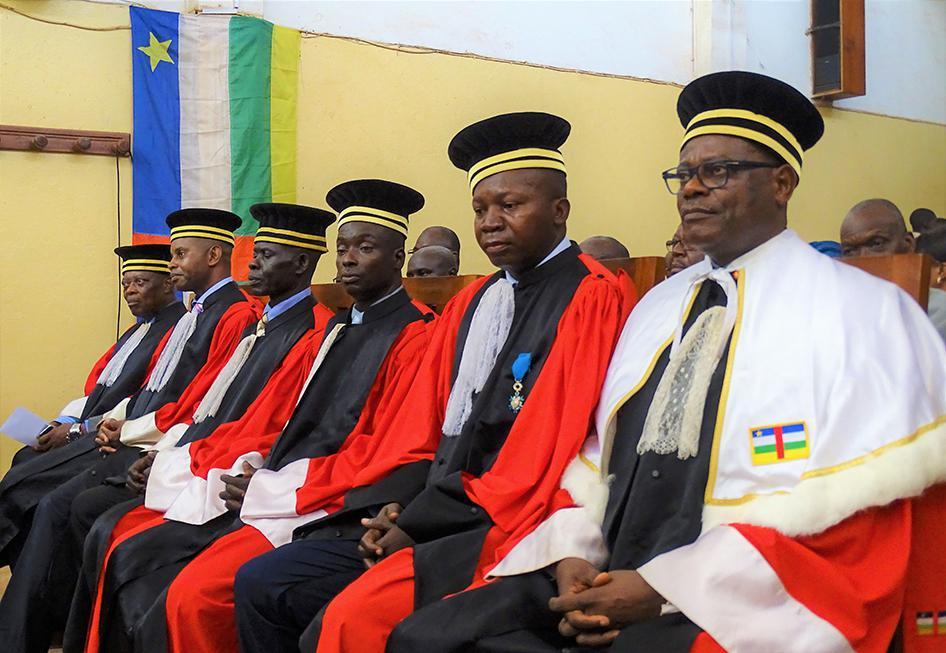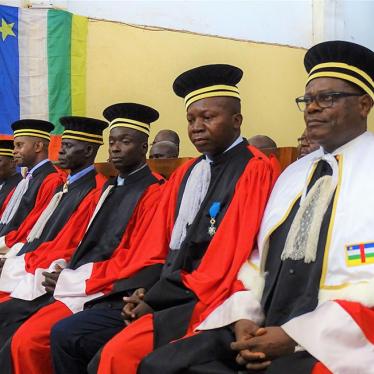(Bangui) – The Central African Republic’s parliament on May 29, 2018, adopted the rules of procedure and evidence for the Special Criminal Court, a war crimes court that is part of the Central African domestic justice system, but has international support and participation.
“Parliament’s adoption of the rules of procedure and evidence is a major step towards making the Special Criminal Court operational,” 40 Central African groups, Human Rights Watch, and the International Federation of Human Rights (FIDH) said. “We now look to the Special Criminal Court’s special prosecutor to forge ahead with investigating the crimes, and for the court to fully integrate victims into the court’s proceedings, so that justice can be done.”
Ahead of the vote, these groups wrote to members of parliament and held a news conference calling for parliament to adopt the rules. The court faces other challenges, not least of which are victim and witness protection and support and security for court staff. But this vote is a step toward ending the impunity that has marked years of bloody conflict and human rights abuses in the Central African Republic, the groups said.
The Central African groups are:
- Association chrétienne d’aide sociale (ACAS)
- Association chrétienne pour l’abolition de la torture (ACAT-RCA)
- Association des éleveurs centrafricains de volailles (AECV)
- Association espérance pour la paix en Centrafrique (AEPAC)
- Association des femmes juriste de Centrafrique (AFJC)
- Association pour l’intégration des jeunes (AIJ)
- Association des jeunes pour l’éducation chrétienne et les oeuvres sociales (AJECOS)
- Association de secours aux enfants atteints de concert (ASEAC)
- Association de solidarité pastorale pour un développement communautaire holistique (ASPDCH)
- Association des victimes des événements de Fatima (ASVI-2015)
- Association des victimes des événements de 2012-2014 (AVED)
- AVIDESC
- Association des victimes de la LRA en Centrafrique (AVLRAC)
- Association des victimes solidaires (AVS-2013)
- Centre d’alphabétisation pour la formation des aveugles en Centrafrique (CAFBAC)
- Coopération agro-pastorale et minière pour le développement (CAMDCA)
- Alerte humanitaire (CALL)
- Carrefour des jeunes
- Coalition pour la cour pénale spéciale (CCPS)
- Centre de documentation d’information et de formation pour le développement (CEDIFOD)
- Commission épiscopale justice et paix (CEJP)
- Civisme et démocratie (CIDEM)
- Conseil inter organisation non gouvernementale centrafricain (CIONGCA)
- Coordination des organisations musulmanes de Centrafrique (COMUC)
- Coordination des plates-formes des organisations nationales d'action humanitaire et de développement en Centrafrique (CPFON-AHDCA)
- Femme homme action plus (FHAP)
- Gestion durable des ressources naturelles et environnementales (GDRNE)
- Groupe de travail de la société civile pour la justice transitionnelle (GTSC-JT)
- Ligue centrafricaine des droits de l’Homme (LCDH)
- Mouvement de défense des droits de l’Homme (MDDH)
- Observatoire centrafricain de droits de l’Homme (OCDH)
- OECSPAE
- Organisation des partisans pour le développement communautaire (OPPDCH)
- Radis-Formation
- Réseau des peuples autochtones et locaux de Centrafrique (REPALCA)
- Réseau national des organisations de la jeunesse pour les droits de l’Homme (RNOJDH)
- Sewa maï (SEMA)
- SOS-Environnement
- SISSITIAKO
- Volontaires unis pour la paix et le développement (VUPAD)








